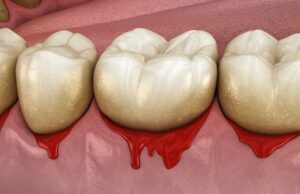A study published in the Journal of Clinical Periodontology suggests that individuals with gum disease can have a higher chance of suffering severe complications from COVID-19. This is due to the link between inflamed gum tissue and the body’s inflammatory response. The irritation in the gums can worsen respiratory problems like what can occur with COVID-19.
With COVID-19 still affecting people all over the world, taking care of your gums and overall oral health is crucial to staying healthy. This periodontal care must include visiting your dentist regularly because their in-office attention will maximize your chances of preventing gum disease and stopping this infection of the gum tissue in its tracks. Read on to learn more about the importance of treating problems with your gums as soon as possible.

Do I Have Gum Disease?
You might wonder what symptoms to look out for when it comes to your gum health and periodontal disease. Gingivitis, the early stage of gum disease, often presents with irritation of the gum tissue, including swelling, soreness, and bleeding.
As gum disease advances, the infection will reach the jaw and tooth root. You might start to see the recession of the gums, bad breath, and tooth discoloration. But gum disease does not always have such noticeable symptoms.
Some patients who have gum disease do not see any symptoms at all. So you should make sure to attend routine check-ups with your dentist. They can spot early signs of gum problems and oral infections and intervene before the conditions worsen.
How Will My Dentist Treat Gum Disease?
If a dentist diagnoses you with gum disease, they can begin treatment of this oral infection right away. They will thoroughly clean your teeth of excess plaque and bacteria, specifically deep in the gum pockets. This targeted cleaning technique is known as scaling and root planing.
They may also give you an antibacterial rinse to help balance the natural bacteria in your mouth. This should alleviate uncomfortable periodontal symptoms while keeping bacteria at bay to reduce further complications from the disease.
More advanced cases of gum disease might need more invasive methods of periodontal therapy to eradicate the infection. This can include flap surgery to access deep infections. This disease is easier to treat when caught early, so seek urgent evaluation and care from your dentist.
Can I Prevent Gum Problems?
To lower your chances of contracting gum disease along with other oral infections, you will need to practice good oral hygiene. Removing plaque in a timely fashion will stop bacteria from spreading and infecting your gum tissue. So make sure you brush your teeth at least twice per day and floss on a daily basis.
You should also attend regular teeth cleaning appointments at your dentist’s office. This will maximize your oral hygiene and preventative dental care. Some patients have higher risks of gum disease, so talk to your dentist to find personalized treatments that suit your unique smile.
